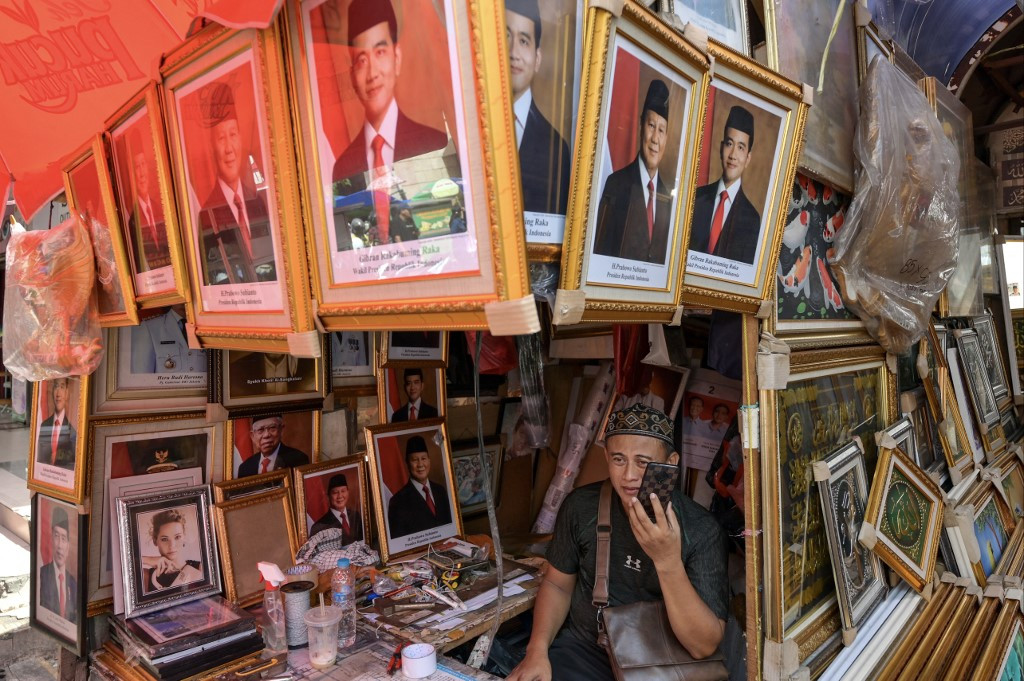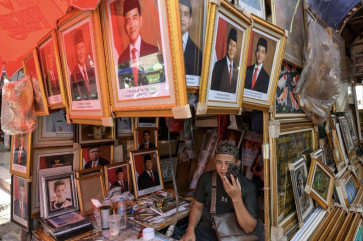Popular Reads
Top Results
Can't find what you're looking for?
View all search resultsPopular Reads
Top Results
Can't find what you're looking for?
View all search resultsCombating the decline in Indonesian democracy
Civil society groups should prepare for and sound an alarm when political actors and/or the new government formulate policies or actions with the potential to reduce the quality of democracy.
Change text size
Gift Premium Articles
to Anyone
 A vendor sells pictures of president-elect Prabowo Subianto (center) and vice president-elect Gibran Rakabuming Raka (right) at his kiosk in Jakarta on April 23, 2024. Pictures depicting the Indonesian president and vice president are mandatory for installation in schools and offices, and many other public spaces. (AFP/Bay Ismoyo)
A vendor sells pictures of president-elect Prabowo Subianto (center) and vice president-elect Gibran Rakabuming Raka (right) at his kiosk in Jakarta on April 23, 2024. Pictures depicting the Indonesian president and vice president are mandatory for installation in schools and offices, and many other public spaces. (AFP/Bay Ismoyo)
T
he General Elections Commission (KPU) confirmed on Wednesday Prabowo Subianto and his running mate Gibran Rakabuming Raka as the winners of the Feb. 14 presidential election, after the Constitutional Court upheld their victory in a split decision on Monday. The Court’s ruling will have an impact on the democratic agenda in Indonesia, whereby the duly elected presidential and vice presidential pair will be responsible for strengthening democracy as their top priority.
They should implement this mission through three programs: restoring and ensuring freedom of the press; restoring freedom of academic discussion; and reestablishing freedom of association, assembly and expression. In addition, to improve the quality of democracy, the new government should set up an institution to manage NGO endowment funds and regulate political financing and financial systems.
Political commitment to improving the quality of democracy is crucial, given that Indonesian democracy has fluctuated over the past decade, with a tendency toward decline. This decline is thought to be the result of a deliberate and continuous violation of the basic principles of democracy by both political actors and the government.
Two international indexing institutions have measured the decline of Indonesian democracy over the past decade. The Economist Intelligence Unit recorded a decline in Indonesia's democracy index of 0.29 from 2013 (6.82) to 2023 (6.53). The overall score over the past decade means that Indonesia's democracy has not improved from a "flawed" status.
From 2014 (64) to 2024 (57), Freedom House recorded a seven-point decline in its Democracy Index. This aggregate index range indicates that Indonesia's democratic status has not moved from being a "partly free" democracy. Indonesia last achieved the status of a “free” country in 2013. The decline was mainly in the aggregate score for the civil liberties category, down six points.
Similarly, the measurement of the Indonesian Democracy Index (IDI) by Statistics Indonesia (BPS) shows an erosion of democracy. Similar to Freedom House's measurement results, civil liberty is an aspect of democracy that has slowly declined. Throughout 2009-2020 the civil liberties score decreased 7.57 points. The new method of measuring the IDI (2021-2022) shows a similar decline, mainly at the provincial level (down 0.69 points).
However, there is irony amid this democratic decline. The public perception of democracy and its performance remains positive. The results of a national poll by Indikator Politik on Feb. 14-20 showed that the majority of the public (61.2 percent) believes that democracy is always better than other systems of government.


















